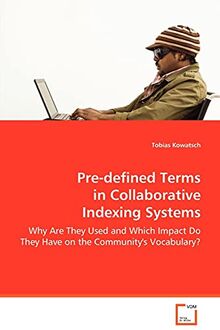
Collaborative indexing systems have attracted an
increasing amount of attention over the last three
years. One fundamental limitation to such a system is
the uncontrolled nature of its vocabulary, as this
consists of terms users freely choose to index
resources. As a result, the vocabulary can be poorly
structured, making it difficult to identify
significant clusters of users, resources, or terms
important for search or exploration features.
Pre-defined terms are suggested to reduce this
uncontrolled vocabulary; these consolidate term
usage if users adopt them. However, this suggestion
has not yet been proved. This work therefore focuses
on an empirical study of the adoption of pre-defined
terms. The model of pre-defined term adoption (MPTA)
is formulated by applying technology acceptance
and diffusion of innovation theories, as well as
constructs of social network analysis. MPTA is then
validated by one lab experiment with 172 German
students, before being cross- validated by two
web experiments with 254 German and 160
English-speaking subjects. Results indicate that
pre-defined terms are appropriate for reducing the
uncontrolled nature of the vocabulary.